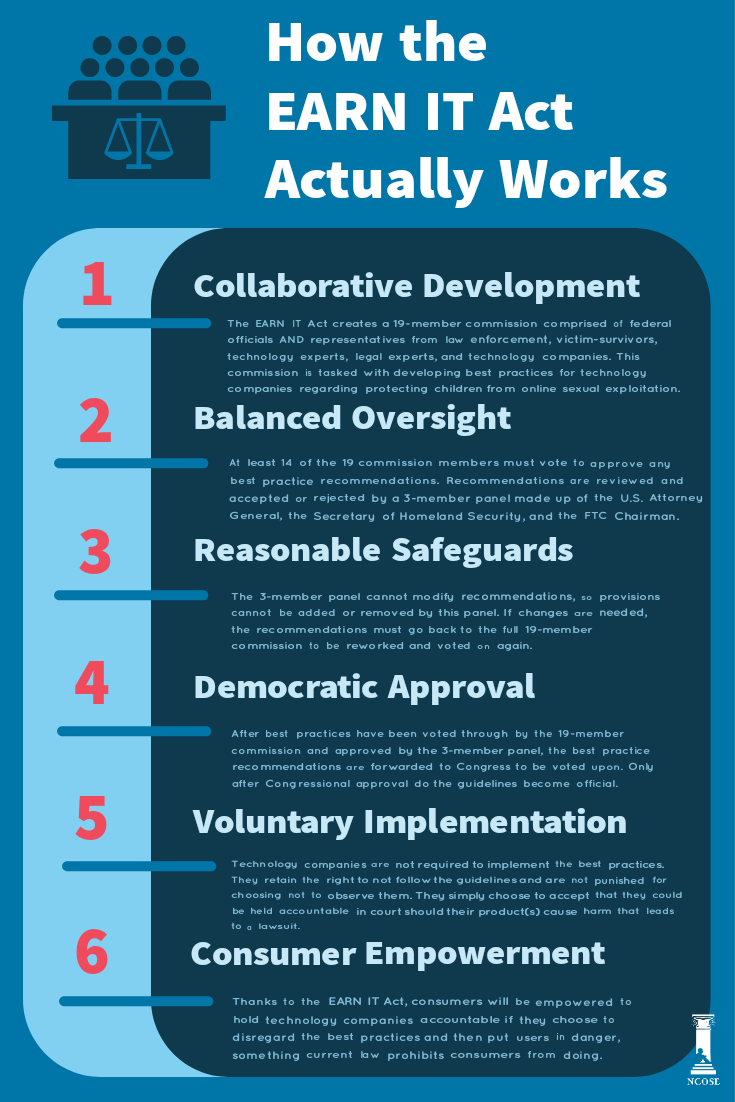This article was posted 04/17/2020. For the most recent information on the EARN IT Act, please see updates here.
This article regarding the EARN IT Act is about the originally published version of the legislation. For the most up-to-date information about the version of the EARN IT Act that was approved by the Senate Judiciary Committee, please read more here.
The EARN IT Act is designed to foster a safer online experience for children without threatening user privacy or encryption.
Children today are at increasing risk of online sexual exploitation. Child sexual abuse material (often referred to as “child pornography”) has exploded over the last two decades, and predators are increasingly flocking to online platforms—often social media platforms—with far-from-ideal safety features in order to target children for grooming and exploitation, including sex trafficking.
In the midst of this horrific reality, technology companies are shielded from any meaningful incentive to create better business practices for protecting children on their platforms. That is to say, technology companies are currently provided carte blanche legal immunity from consumers by Section 230 of the Communications Decency Act (except for cases of knowingly facilitating sex trafficking). As it stands right now, no matter how recklessly online products may be designed in regard to the safety of the children who use them, consumers have no legal recourse against technology companies in this space.
The EARN IT Act — which would put in place a participatory process for the development of better business practices in the online space as it relates to child sexual exploitation — stands to reasonably empower U.S. consumers by restoring their right to attempt to hold technology companies accountable in the court of law for any recklessly dangerous products they create. This is a fundamental right that U.S. consumers already have in almost every other sphere of business.
The technology community knows that encryption is fully compatible with robust efforts to fight online child sexual exploitation and combat the rise of online child sexual abuse material. #EARNITAct Share on XThe EARN IT Act also offers the technology industry a substantial hand in developing the voluntary guidelines that will strengthen online child protection.
How the EARN IT Act Actually Works
Most arguments from those advocating against the EARN IT Act boil down to attempting to position the bill as a threat to encryption.
This is misleading because the bill says nothing about encryption and, in fact, the bill doesn’t create any specific rules or guidelines for technology companies at all. Undeterred, the anti-EARN IT crowd have gone on to claim that the bill could create a backdoor for a possible legislative attack on encryption somewhere down the line. Maybe.
This, too, is ultimately a red herring because: 1) There already are and long have been myriad ways that encryption could be attacked apart from this bill and 2) The EARN IT Act actually sets up a process with important safeguards that would make it difficult for encryption to be threatened through the system it creates.
Here, from a previous article, is a short summary of how the EARN IT Act would work in practice:
To develop and determine the voluntary best practices that technology companies will have the choice to observe (or ignore), the EARN IT Act sets up a 19-member commission comprised of federal officials AND representatives from law enforcement, victim-survivors of child sexual exploitation, technology experts, legal experts, and representatives from technology companies. At least 14 members of the commission must support a best practice before it is approved and the bill stipulates that six of the 19 committee members are technology experts (two members) and representatives of technology companies (four members).
After best practices are approved by the commission, the attorney general, the secretary of homeland security, and the FTC chairman must then accept the recommendations as written in order to send them in front of Congress for confirmation (or Congress could vote them down and send them back to the commission). After that, the recommendations of the commission only become official once Congress has voted to enact them.
Even after any recommendations are confirmed via Congressional vote, it’s important to remember, technology companies are not forced or compelled to follow the guidelines for best practices that have gone through this process. Adoption is voluntary and there is no direct punishment for technology companies who choose not to follow them. That is to say, the EARN IT Act provides a proverbial “carrot” of incentive rather than a “stick.”
Since 1) the technology sector is well represented in the makeup of the commission created by the EARN IT Act, 2) the approval committee does not have the power to unilaterally change or amend the commission’s recommendations, and 3) any approved recommendations are further subject to approval through the established democratic process of Congressional approval, the EARN IT Act is not a liability to user privacy and encryption like some in the technology industry would like you to believe.
How The EARN IT Act Can Protect Children AND User Privacy and Encryption
It’s important to note that, when directly questioned on this point during a hearing on the EARN IT Act in the Senate Judiciary Committee, a lawyer representing the technology industry confirmed Senator Richard Blumenthal’s statement that the technology community knows that encryption is fully compatible with robust efforts to fight online child sexual exploitation and to combat the rise of online child sexual abuse material.
Additionally, the mechanics of the bill show that the EARN IT Act is far from a mechanism for mass government surveillance like some in the tech community are trying to claim. Instead, the EARN IT Act is an opportunity for the technology sector to maintain its advocacy for user privacy and encryption—if that is indeed what the technology sector truly cares about—at the same time that consumer rights are restored in an area where they have been repressed.
The EARN IT Act can help protect children from online sexual exploitation and restore consumer rights without jeopardizing user privacy and encryption. #EARNITAct Share on XThe EARN IT Act is designed in such a way that not only will the technology industry be able to prevent any potential threats to encryption and user privacy from being rammed through the 19-member commission but it will also have a new and unique opportunity AND incentive to creatively shape both business practices and technology solutions that prioritize the rights of adults AND children.
Accordingly, the technology industry can be an important check against threats of governmental overreach into the lives of American citizens—if it wants to be.
While the tech industry has attempted to claim that the risk of liability is a “threat to its existence,” the reality is that most industries operate under risk of liability in many ways and find ways to both survive and thrive. Indeed, risk of liability empowers consumers in a healthy way and creates a creative challenge for companies that has the net benefit of increased safety for consumers. As such, consumers become an important check against threats of corporate abuse of American citizens—children, in particular.
So, with the EARN IT Act, an important system of checks and balances is restored in an area where it has been lost.
In the form of the more empowered American consumer, the technology industry is provided with a much-needed incentive for better protecting children from online sexual exploitation AND is still afforded an important role in protecting the rights of the U.S. consumer to privacy from governmental overreach. In this scenario, the American consumer regains their right to hold the technology industry accountable when necessary AND, if what the technology sector is saying about its commitment to user privacy is true, also has a set of encryption experts helping to advocate on their behalf and protecting against privacy encroachment from the government.
What You Can Do to Help
With all of this in mind, it is important that we as citizens make our voices heard with our elected officials.
The technology industry has a powerful lobby and, contrary to the philanthropic-sounding reasons they are using to oppose the EARN IT Act, they want to protect their profits and will work hard to protect themselves from the empowered American consumer.
To counter them, your elected officials need to hear from you. The collective voice of the people who elect them to office still has a significant impact on senators and representatives on Capitol Hill.
With the EARN IT Act, an important system of checks and balances is restored in an area where it has been lost. #EARNITAct Share on XWe have created an easy-to-use Action (which is also embedded below) that will allow you to quickly and seamlessly contact your U.S. Senators via email and social media.
Take action today to protect children from online sexual exploitation!



